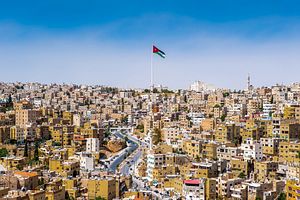Indonesia’s relations with countries in the Middle East have not received a great deal of attention. In reality, however, as Indonesia-Jordanian relations show, ties have gone beyond the diplomatic and political realms.
Even though relatively silent, the ties between Jakarta and Amman have witnessed remarkable developments since the two countries established their relationship in 1950, and trade is at the heart of their expanding cooperation. It was reported that the trade volume between Jordan and Indonesia reached $438.59 million last year, more than double the level of 2012. This makes Indonesia Jordan’s largest trade partner in Southeast Asia. Jordan mainly exports potash and phosphates while importing wood, tea, coffee, textiles, furniture, and palm oil. With Indonesian Ambassador Teguh Wardoyo raising the possibility of a free trade agreement early last year, the future looks promising.
Jordan’s growing interest in Indonesia is also manifested in its investments. It was reported by the Indonesian Investment Coordination Board (BPKM) that last year Jordan invested $232.9 million in eight projects in Indonesia. Amman’s investment in the archipelago is most pronounced in the phosphate industry. In 2011, Jordan Phosphate Mines Co. Plc. (JPMC) and PT Petrokimia Gresik (Petroges) inked an agreement to construct a phosphoric acid plant in Gresik, East Java. Petrogres and JPMC had earlier formed a joint venture company, PT Petro Jordan Abadi, with each holding a fifty-percent share. Recently, during King Abdullah II of Jordan’s visit to Jakarta in February this year, JPMC signed a memorandum of understanding with two Indonesian companies to build two phosphoric acid projects. According to the MOU, one of the units will be built in East Kalimantan, Indonesia and the other in Jordan.
The bilateral relations between Amman and Jakarta have expanded into multiple fronts. It was reported that Indonesia, through its embassy in Amman, has signed an agreement with Yarmouk University to offer Indonesian language courses. At the same time, there are currently a significant number of Indonesian students pursuing education at different universities in Jordan. Although strengthening relations is not a simple process, a strong focus on education might help to do so.
Cooperation in the infrastructure and development sectors has also become increasingly visible. In May this year for example, the Indonesian Ministry of Public Works and Jordan’s Ministry of Public Housing reinforced infrastructure cooperation in areas including bridges, roads, spatial management and housing, as well as water and sanitation. At the same time, the Jordanian government has offered investment opportunities for Indonesian businessmen in real estate and infrastructure. Other exchanges are taking place in the realms of agriculture and banking.
Reciprocal ties continue between Amman and Jakarta through different channels. The issue of workers is one of the subjects that dominate the Indonesia-Jordanian relationship. Cases of migrant workers being abused in Jordan, many of whom are from Indonesia, have long been a human-rights concern. They have become diplomatic issues as well, and have prompted the two countries to sign two separate MOUs in 2001 and 2009 focusing on the protection of Indonesian workers employed in Jordan. According to the Jakarta Post, around 30,000 Indonesians are currently working in different sectors in the Kingdom.
As the expanding cooperation seems to be mutually beneficial to both sides, efforts have been made by Jordan and Indonesia to strengthen their bilateral cooperation. The Jordanian-Indonesian Business Council was formed in 2009, which seeks to promote joint trade and investment initiatives as well as to exchange business, legislation, external trade, and customs data. In addition, the Indonesian Days expo was also held in Amman in 2012. The four-day expo included an agriculture and industry fair that aimed to introduce Indonesian products to Jordanian businessmen and the public. Acknowledging the significance of air connectivity, the two governments are planning to re-establish a direct flight between Jakarta and Amman.
Looking ahead, the reciprocal ties between Jordan and Indonesia will continue to expand in the future. These ties may extend into different areas, including health, culture, and tourism. There is also the prospect of a growing military partnership. As the two leaders discussed earlier this year, the countries are seeking to boost their cooperation and the transfer of defense technology.
The prospect of military cooperation would be of great advantage to both Amman and Jakarta. As the threat of cross-border instability and violence continues, Jordan seems to have no other option but to continue to develop its defense capabilities. Highly dependent on imports, the Jordanians may eventually find Indonesian arms producers more affordable than its traditional suppliers. Meanwhile, as Indonesian arms manufacturers are increasingly interested in reaching an international market, Jordan could be a good start.
At the same time, as Southeast Asia’s largest economy, Indonesia is viewed by Jordan as a promising target for expanding investment. While its neighbors are in turmoil, moving towards Southeast Asia would be a reasonable move. Seeing these prospects, the Amman Chamber of Commerce has pledged to step up its efforts to increase trade and investment between Jordan and Indonesia.
On the other hand, as Jakarta is seeking to diversify its consumer market to protect against the risk of possible economic turmoil in the U.S. and European markets, Jordan not only offers Indonesia a way to access untapped export markets, as well as lucrative investment opportunities, it could also potentially serve as a hub for economic expansion in the wider Middle East.
Muhammad Zulfikar Rakhmat has lived in the Middle East for seven years. He holds a B.A. in International Affairs from Qatar University and is currently pursuing an M.A. in International Politics at the University of Manchester.
































